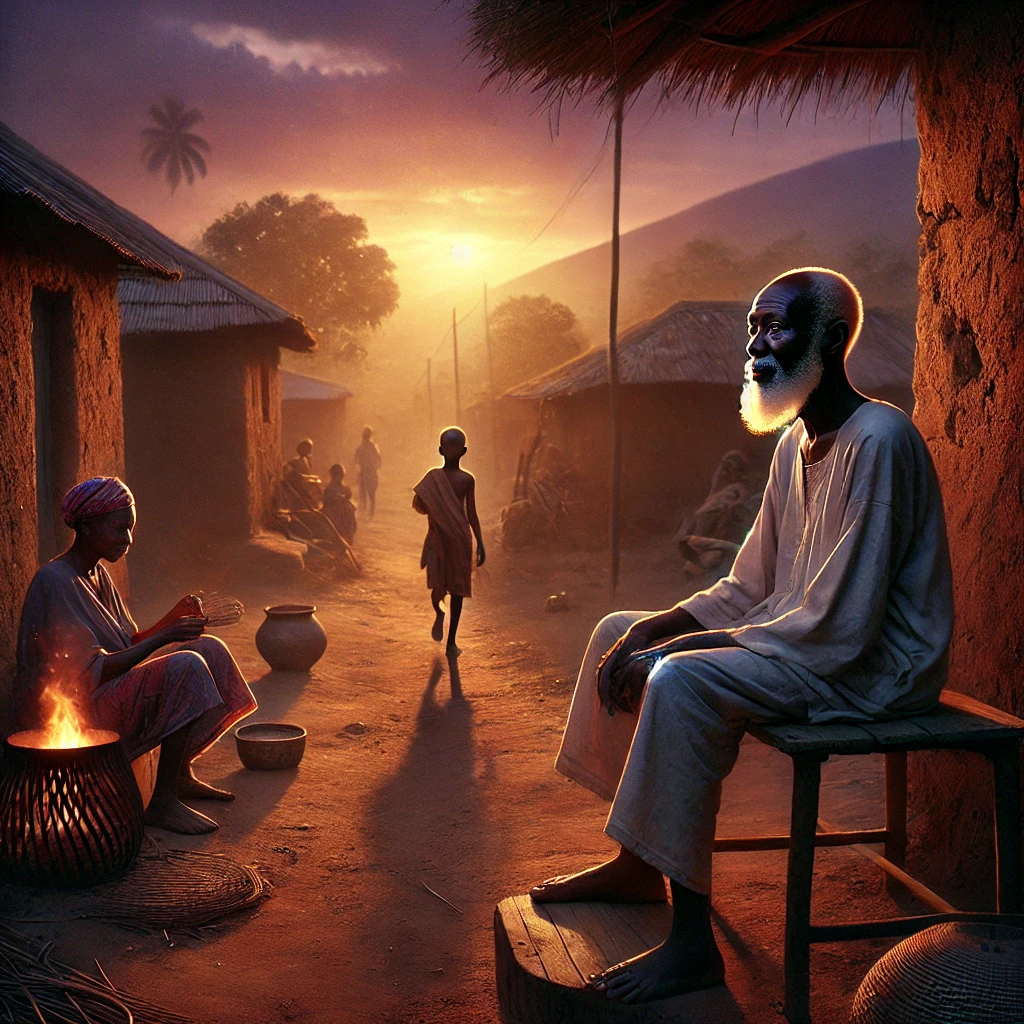

The Redemption, Tunde The Orphan Part 7, African Nigerian Stories, Novels, Tales, Folktales
The Redemption, Tunde The Orphan Part 7, African Nigerian Stories, Novels, Tales, Folktales
The days that followed Tunde’s confession were unlike any his grandparents had known. Each morning, before the first rays of sunlight broke through the misty horizon, Tunde would rise quietly from his mat, careful not to disturb Baba Mufu and Mama Tinu. He fetched water from the stream, carrying the heavy pots with ease, his steps steady as though driven by an unseen force. By the time the household stirred awake, Tunde would already be outside, chopping firewood or sweeping the compound with deliberate care.
Mama Tinu was the first to notice the change, though she dared not voice her thoughts for fear of breaking the spell. She watched from the doorway one morning as Tunde scrubbed the wooden mortar with a piece of coarse sponge, his hands moving methodically. She had never asked him to clean it, but there he was, doing it without complaint or instruction.
“Tunde,” she called softly.
He paused, looking up at her with a calm expression. “Yes, Mama?”
“You have been working hard, my boy,” she said, her voice trembling slightly. “Is everything alright?”
Tunde nodded, setting the sponge aside. “It is, Mama. I just want to make things easier for you and Grandfather.”
Her heart swelled with pride and relief, though she couldn’t ignore the pang of guilt that followed. How long had Tunde been carrying his pain in silence, waiting for a moment to prove himself worthy of their love? She reached out and touched his shoulder gently. “You have already given us more than we could ask for.”
A Transformation in Action
The change in Tunde was not fleeting. Day after day, he poured himself into the tasks that had once seemed so daunting to him. He worked beside Baba Mufu in the fields, his hands blistered but steady as he harvested yams and cassava. He carried baskets of produce to the market, negotiating prices with a maturity that surprised even the most seasoned traders.
Baba Mufu, though initially skeptical of the sudden transformation, began to see it as more than a phase. He noticed the way Tunde listened intently during their evening conversations, his dark eyes focused as Baba Mufu shared stories of their ancestors and the traditions that had shaped their family.
One night, as they sat outside under a canopy of stars, Tunde asked, “Grandfather, what does it mean to honor the ancestors?”
Baba Mufu leaned back in his chair, stroking his white beard thoughtfully. “To honor the ancestors is to live in a way that brings pride to those who came before us,” he said. “It means respecting the land, the spirits, and the people around you. It means understanding that you are part of something much larger than yourself.”
Tunde nodded, his expression serious. “I want to honor them,” he said. “And I want to honor you and Mama. I will not forget the sacrifices you have made for me.”
Baba Mufu felt a lump rise in his throat. He had always believed that words held power, but in that moment, it was Tunde’s sincerity that moved him most.
The Village Takes Notice
At first, the villagers observed Tunde’s transformation with caution. The boy who had once been known for his mischievous antics was now seen carrying heavy water pots for elderly women, repairing fences, and sweeping the village square. It was as though a different spirit had taken root within him, one that exuded humility and kindness.
“Have you seen Tunde lately?” one woman whispered to her friend as they watched him help Elder Oba fix a broken bench. “He is not the same boy.”
The whispers grew louder, spreading through the village like wildfire. Mothers who had once warned their children to avoid Tunde now invited him into their homes, offering him food and praise. Fathers began to seek his help with labor-intensive tasks, marveling at his quiet strength and unwavering work ethic.
“He has been touched by the ancestors,” one elder declared during a gathering. “They have shown him the error of his ways.”
The children, who had once been afraid of Tunde’s rebellious streak, now followed him eagerly, imitating his movements as he worked or listened intently as he shared stories he had learned from Baba Mufu. Tunde became a symbol of redemption, a reminder that even the most wayward soul could find its way back to the light.
A Celebration of Change
Months after Tunde’s transformation began, the villagers decided to honor him with a small celebration. It was Elder Oba’s idea, and the entire community rallied behind it. Women prepared steaming pots of jollof rice and pepper soup, while men brought palm wine and set up lanterns around the village square. The children wove garlands of flowers, giggling as they draped them over Tunde’s shoulders.
Baba Mufu and Mama Tinu sat proudly at the center of the gathering, their faces glowing with pride. Tunde, though visibly humbled by the attention, accepted their praise with quiet gratitude.
As the drumming began, Elder Oba stood and raised his hand for silence. “Tonight, we celebrate not just the change in one boy,” he said, his voice carrying through the crowd, “but the power of love, forgiveness, and the guidance of our ancestors. Tunde has shown us that no soul is beyond redemption.”
The crowd erupted into cheers, their voices rising in unison as Tunde was invited to lead a traditional dance. He moved with grace and confidence, his steps in perfect harmony with the rhythm of the drums. For the first time, Tunde felt truly at peace—not because he was being celebrated, but because he knew he had earned their respect through his actions.
The River’s Call
Despite his growth, Tunde continued to visit the river often. It had become a place of reflection for him, a reminder of the warning he had received and the promises he had made. Baba Mufu and Mama Tinu, though still wary of the river’s hold on him, respected his need for solitude.
One evening, as Tunde sat by the river, he closed his eyes and let the sound of the water soothe him. He thought of the shadowy figure that had appeared to him, the visions it had shown him, and the words it had spoken.
“I will not forget,” he whispered to the river. “I will honor you and the lessons you have taught me.”
As the moonlight danced on the surface of the water, Tunde felt a sense of closure. He knew that the river would always be a part of him, but it no longer held the power to frighten him. It was a connection, not a curse—a bond that reminded him of the strength and wisdom that came from understanding his past.
A Legacy of Redemption
Tunde’s transformation left a lasting impact on the village. His actions inspired others to reflect on their own lives and relationships, to mend broken ties and honor their traditions. Baba Mufu and Mama Tinu, once burdened by worry, now carried a lightness in their hearts, their love for Tunde deepened by the journey they had shared.
On quiet evenings, as they sat together under the stars, Baba Mufu would often think of the dream that had started it all—the river, the shadowy figure, and the whispers of the ancestors. He realized now that the dream had been a blessing, a reminder of the invisible threads that connected their family to those who had come before them.
And as Tunde carved another wooden figure, his hands steady and his heart full, he knew that his journey was far from over. But he also knew that he carried within him the strength of his ancestors, the love of his family, and the promise of a life redeemed.












